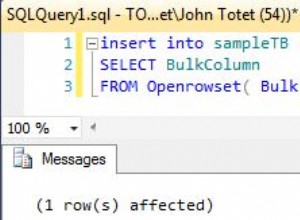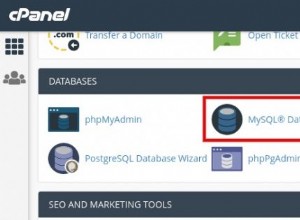Nel caso qualcuno volesse fare qualcosa di simile, pubblicherò il codice che ho scritto e testato nelle ultime cinque ore.
Ho deciso di convertire le mie due tabelle in tre, spostando tutte le opzioni ricorrenti nella terza tabella:
'churchcal_events' - ci sono campi aggiuntivi per le informazioni sull'evento che non ho incluso qui
+----+-----------+------------+------------+------------+-----------+
| id | name | date | starttime | endtime | recurring |
+----+-----------+------------+------------+------------+-----------+
| 1 | Event 1 | 2013-04-01 | 10:30:00 | 12:00:00 | 0 |
| 2 | Event 2 | | 14:00:00 | 15:00:00 | 1 |
| 3 | Event 3 | | 09:00:00 | | 1 |
| 4 | Event 4 | | 19:00:00 | 21:00:00 | 1 |
+----+-----------+------------+------------+------------+-----------+
'churchcal_assign' - indirizza gli eventi a calendari appropriati (perché ci saranno calendari per diversi dipartimenti nel sito Web)
+----------+-------------+
| event_id | calendar_id |
+----------+-------------+
| 1 | 1 |
| 2 | 1 |
| 3 | 1 |
| 4 | 1 |
+----------+-------------+
'churchcal_recur_events' - Ecco le regole per la ricorrenza di ogni evento
+----------+-----------+------------+----------------+------------+-------------+-----------+
| event_id | frequency | recur_type | recur_day_num | recur_day | recur_start | recur_end |
+----------+-----------+------------+----------------+------------+-------------+-----------+
| 2 | 1 | Week | NULL | Sunday | NULL | NULL |
| 3 | 2 | Week | NULL | Wednesday | 2013-04-01 | NULL |
| 4 | 2 | Month | third | Friday | 2013-04-01 | NULL |
+----------+-----------+------------+----------------+------------+-------------+-----------+
Nuovo codice (PHP) - Questo è in un ciclo giornaliero
//query all events
$get_events = db_query("SELECT * FROM {churchcal_events ce, churchcal_recur_events cre}
WHERE (MONTH(ce.date) = :month AND YEAR(ce.date) = :year AND DAY(ce.date) = :day) OR
(ce.id = cre.event_id AND ce.recurring = :recur AND cre.recur_day = :calendar_day)
ORDER BY starttime",
array(
':month' => $month,
':year' => $year,
':day' => $list_day,
':recur' => '1',
':calendar_day' => date('l', strtotime($month . '/' . $list_day . '/' . $year)),
));
foreach($get_events as $event) {
//see if events belong to this calendar
$calendar_assign = db_query("SELECT * FROM {churchcal_assign} WHERE event_id = :event_id AND calendar_id = :cal_id",
array(
':event_id' => $event->id,
':cal_id' => $cal_id,
));
if($calendar_assign->rowCount() > 0) {
//one-time events
if(($event->recurring != '1') && ($single_event_id != $event->id)) {
$calendar .= calendar_event($event->id, $event->name, $event->starttime);
$single_event_id = $event->id;
//$calendar .= $single_event_id;
}
//monthly recurring events
if(($event->recur_type == 'Month') && ($event->recurring == '1')
//day is on or before end date
&& (($event->recur_end >= date('Y-m-d', strtotime($month . '/' . $list_day . '/' . $year))) || ($event->recur_end == '0000-00-00') || ($event->recur_end == NULL))
//day is on or after start date
&& (($event->recur_start <= date('Y-m-d', strtotime($month . '/' . $list_day . '/' . $year))) || ($event->recur_start == '0000-00-00') || ($event->recur_start == NULL))
//day is equal to date of recurrence, i.e. first friday, third monday, etc
&& ($year . date('m', strtotime($year . '/' . $month . '/' . $list_day)) . $list_day == date('Ymj', strtotime($event->recur_day_num . ' ' . $event->recur_day . ' of ' . date('F', strtotime($month . '/' . $list_day . '/' . $year)) . ' ' . $year)))
//day is in agreement with month frequency, i.e. every month, every other, etc. from start date
&& ($month % $event->frequency == date('m', strtotime($event->recur_start)) % $event->frequency)) {
$calendar .= calendar_event($event->id, $event->name, $event->starttime);
}
//weekly recurring events
if(($event->recur_type == 'Week') && ($event->recurring == '1')
//day is on or before end date
&& (($event->recur_end >= date('Y-m-d', strtotime($month . '/' . $list_day . '/' . $year))) || ($event->recur_end == '0000-00-00') || ($event->recur_end == NULL))
//day is on or after start date
&& (($event->recur_start <= date('Y-m-d', strtotime($month . '/' . $list_day . '/' . $year))) || ($event->recur_start == '0000-00-00') || ($event->recur_start == NULL))
//day is in agreement with week frequency, i.e. every week, every other, etc. from start date
&& (date('W', strtotime($month . '/' . $list_day . '/' . $year)) % $event->frequency == date('W', strtotime($event->recur_start)) % $event->frequency)) {
$calendar .= calendar_event($event->id, $event->name, $event->starttime);
}
}
}
Se non lo stai creando in un modulo Drupal come me, puoi sostituire 'db_query()' con la tua funzione di query del database come l'impostazione predefinita di PHP 'mysql_query()';




